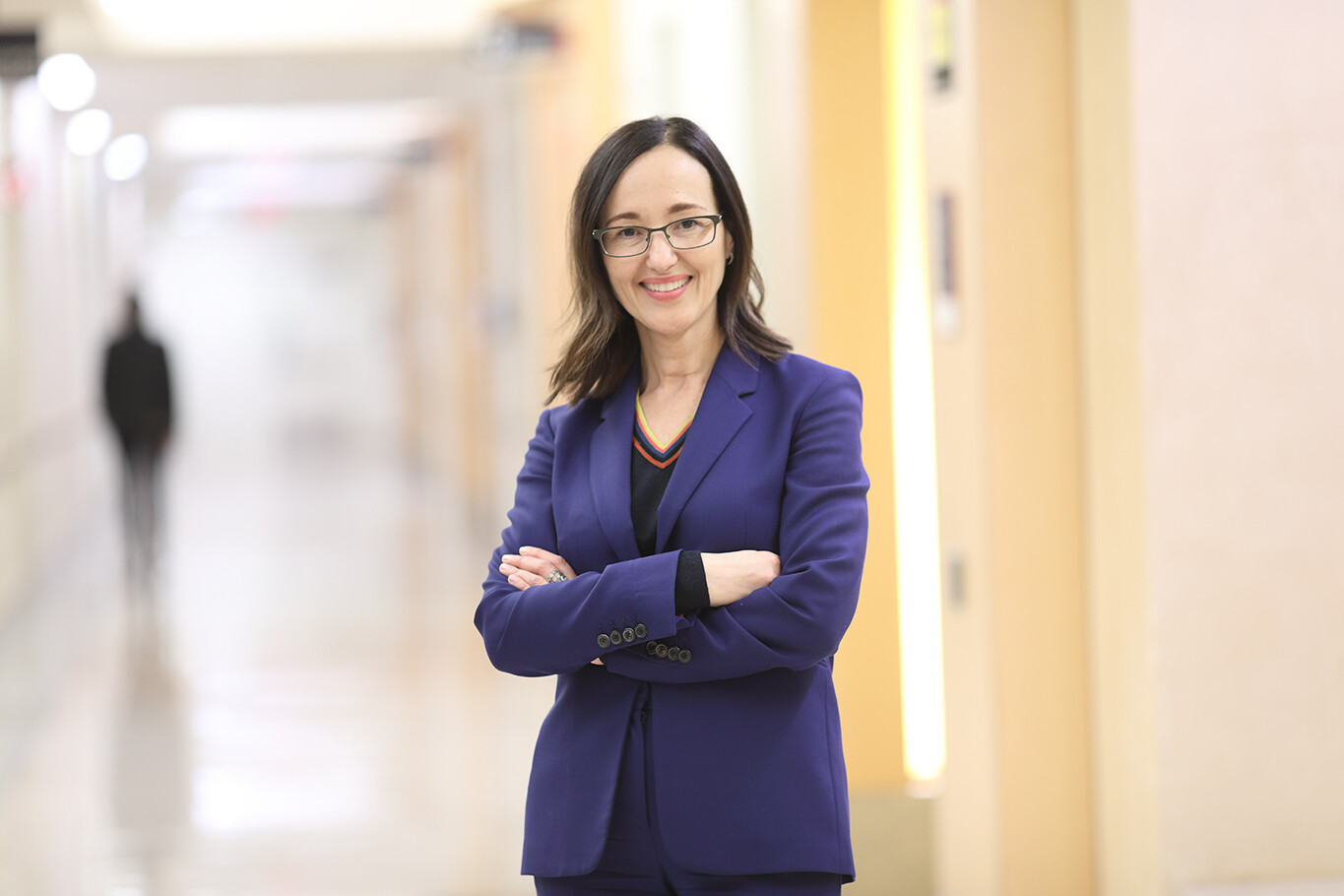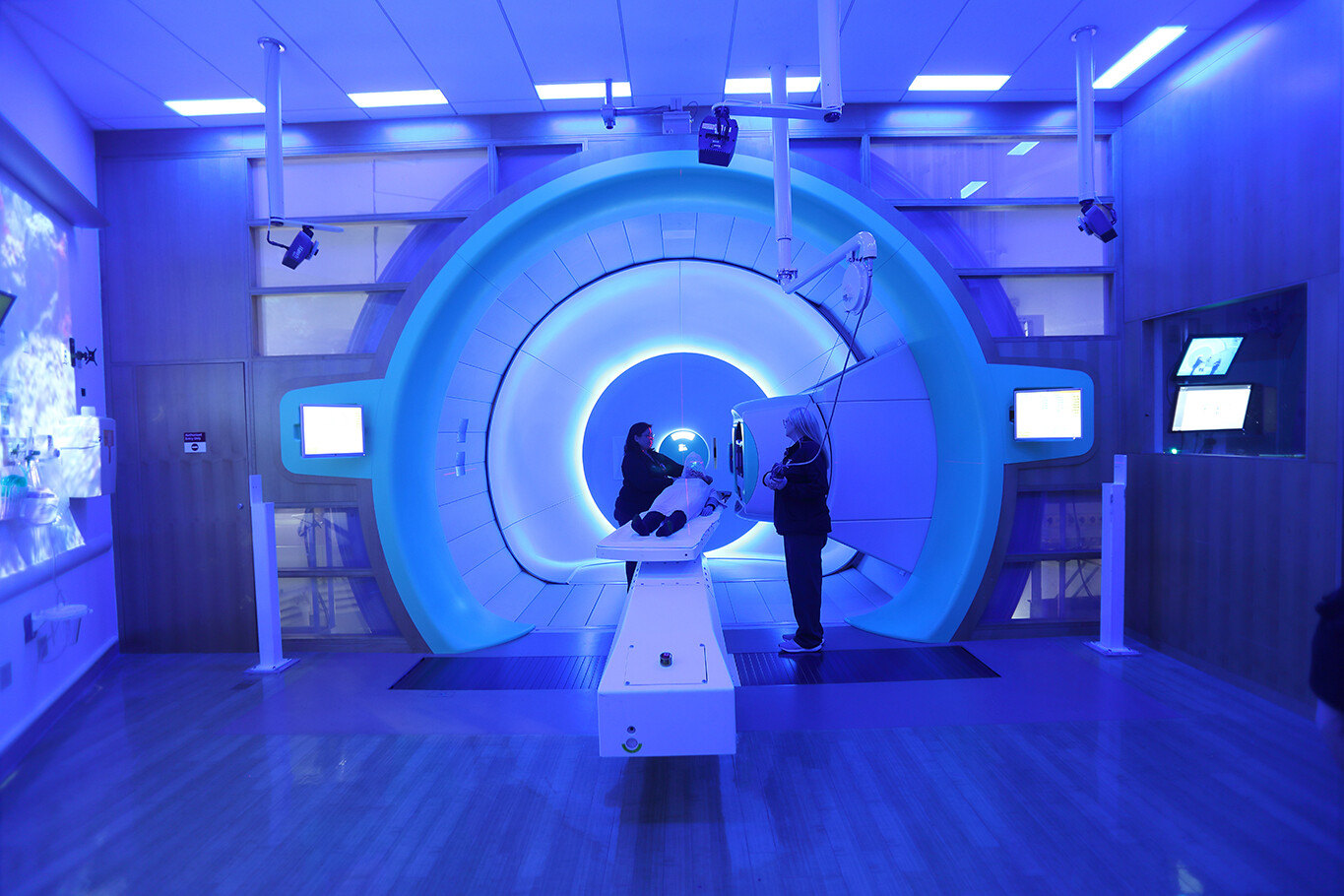
nocred

When Patricia Corby, the new associate dean for translational research at Penn’s School of Dental Medicine, was leading clinical research operations at New York University (NYU) College of Dentistry and working with radiation oncologists at its Langone Medical Center, she started paying attention to the oral health of patients with head and neck cancer. Radiation therapy is commonly used to treat such patients, but it can wreak havoc on their oral cavity. Oral mucositis, when radiation triggers painful ulcers that make it difficult or impossible for patients to eat and function normally, is a common but debilitating effect of treatment.
“It can affect the whole oral mucosa, the tongue, the throat, even the intestinal tract,” says Corby, who joined Penn Dental Medicine in April as associate professor of oral medicine, “and it’s a disaster. Severe cases place patients at risk for secondary infections and even sepsis due to open sores in the mouth. Sometimes it interrupts cancer treatment, and in the worst cases treatment can’t continue.”
Corby had a thought after seeing the poor oral health of some patients at the outset of radiation therapy: What if a thorough, professional cleaning of their mouths during cancer treatment, aimed at preventing the colonization of “bad” bacteria in the mouth, could help reduce or even prevent this side effect of cancer care?
That thought led to a small pilot study, which has grown into an $8 million National Institutes of Health-funded project that she is embarking on at Penn this year.
“I never look at the teeth, or even the mouth, as one thing,” Corby says. “I look at them in the context of the whole body and systemic health.”
Joining Penn Dental Medicine with experience in microbial genetics, bioinformatics, and clinical research operations, Corby is bringing this holistic approach to bear in her new role heading up clinical research at the School. Working with Mark Wolff, the Morton Amsterdam Dean, with whom she collaborated extensively on clinical trials while both were at NYU, Corby aims to develop a robust translational medicine program for the School, expanding opportunities and support right on campus for faculty to move their findings from the lab into the clinic.
A way to help
Upon graduating from dental school in Brazil, Corby began her career by opening her own practice. If a patient came for treatment and was unable to pay, she would see them anyway. But soon she came to the realization that there was a way to help patients and still have a sustainable career: by moving into clinical research. The field had the added benefit of being continually engaging.
“I also saw how beneficial clinical research would be to bring novel approaches and new ideas to improve patient care and their health overall,” she says.
She started her oral-health research by designing studies examining the role of genetics and environmental factors in modulating the microbiome and affecting health and disease. The work involved 500 pairs of twins and tracked the connection between heritable and environmental factors when it came to oral conditions such as caries, gingivitis, and periodontal disease. She found that, while genetics had a strong influence in healthy individuals, once oral health was compromised, the environment held much more sway.
“Even if your genes didn’t predispose you to that disease,” says Corby, “once environmental factors such as bad oral hygiene lead to something like periodontitis or caries, it overrides what the genes dictate. Similarly, tobacco use, heavy alcohol use, and human papillomavirus infection increase the risk of oral and oropharyngeal cancer.”
Those findings from early in her career underscored an important lesson: preventive approaches are critical.
“Everything I do,” she says, “it’s aimed not at treating disease; it’s to preserve health.”
Armed with expertise in implants and periodontics, in addition to her genetics and microbial research, she took a faculty position in 1998 at the University of Pittsburgh. While there, she also earned a master’s degree in biomedical informatics to help understand how computer science and cutting-edge technology could inform her burgeoning studies of the microbiome, which she further explored during a few-year stint as a research associate at Harvard University and the Forsyth Institute, Boston.
By 2006, she joined the faculty of NYU, an institution that, at the time, had recently finished building a new center for clinical research, the first of its kind housed within a dental school. There she began leading operations for the center, overseeing hundreds of studies, from phases 1 through 4, which ran the gamut from medical to dental applications, for pharmaceutical clients and others. After seven years within the dental school, she moved to the NYU School of Medicine’s Langone Medical Center. There, as director of clinical research operations and interim director of the Office of Clinical Trials from 2015 to 2016, she was responsible for the oversight of roughly 3,000 active trials at any given time. At the same time, she carried out research alongside her administrative responsibilities and became skilled in managing the intricacies and details involved in applying for highly competitive, complex NIH grants. She assisted investigators in grant development, submission, and successful implementation.
The power of prevention
It was also during this time at NYU that she transitioned her work from looking primarily at caries and gum disease and their relation to systemic health, toward the pilot project involving cancer patients receiving radiation.

It began by Corby simply asking the head and neck surgeons and radiation oncologists if she could do a thorough cleaning of patients’ mouths before commencing their therapy. She kept tweaking the protocol, eventually building up to weekly cleanings designed to rid their mouths of as much pathogenic bacteria as possibly, setting the stage for more beneficial microbes to recolonize. The cleanings involved clearing the dead, damaged, or infected oral mucosa tissues in combination with physically removing dental plaque and tartar.
After she had treated a dozen or so patients, she got a call from the medical director of the cancer center, a radiation oncologist. “He said, ‘Pat, I know you’ve treated a few patients, but I want to know what you’re doing.’ I thought to myself, ‘Oh, am I doing something wrong?” and asked him if there was anything wrong with the patients.”
As it turned out, the opposite was true. Patients who received the weekly prophylactic cleanings from Corby were doing well; they weren’t losing weight like some other patients, and importantly were not experiencing the severe oral mucositis that untreated patients were. Because they had less pain and distress, they also felt much more positively about their treatment.
Corby crafted a more formalized trial, showing that this proactive approach to cleaning patients’ mouths was not only safe but beneficial. “The difference between the experimental group and the controls was amazing,” Corby says. In addition to looking for signs of oral mucositis, the study also involved collecting microbiome samples from the oral mucositis lesions, taking saliva samples to test for markers of local and systemic inflammation, and conducting a number of patient surveys to assess pain and quality of life. Because experiencing oral mucositis can compromise a patient’s ability to complete a round of radiation therapy, if one could reduce the incidence of this painful condition, it could increase the likelihood that a patient receives the appropriate treatment needed to tackle the cancer. (See sidebar for patient Erica Casucci’s story.)
During the last two years, Corby used an NIH planning grant to prepare for a full-fledged clinical trial to test her protocol in a much larger population of cancer patients. And when she made the decision to come to Penn late last year, she began the process of transitioning the full study here.
A vision for clinical rigor
To do so, Corby has made the most of her time at Penn Dental Medicine, reaching out to Alexander Lin, chief of the Head and Neck Oncology Service and medical director of the Roberts Proton Therapy Center in Penn’s Perelman School of Medicine, to be a co-principal investigator on the larger NIH study. The trial is a collaborative effort between faculty from Penn Dental Medicine’s departments of Oral Maxillofacial Surgery and Oral Medicine (including Corby, Takako Tanaka, and Katherine France) and Penn Medicine’s Department of Radiation Oncology (including Lin, Samuel Swisher-McClure, and John Lukens). Putting patient comfort and convenience at the forefront, patients will be recruited and receive their study-related oral cleanings in the same building where they receive their radiation therapy, one of the benefits of sharing a close partnership and proximity with Penn’s medical school.
Yet looking ahead, as an expert in clinical trials, Corby has ambitious plans to build up the Penn Dental Medicine’s capacity for supporting faculty conducting clinical trials in its own facilities. With support from Wolff, Corby is overseeing the development of a clinical research center, an area that may be small at first but private and easily accessible for participating patients. She hopes to leverage the relationships with pharmaceutical companies that she and Wolff developed during their past experiences working on clinical trials to begin building a larger portfolio of clinical work to be conducted at Penn Dental Medicine.
“We want to build up a hub for faculty conducting clinical trials, so that patients can be seen there, screened, and included in studies,” Corby says. “And, if they may need referrals for more comprehensive dental care, they’ll be right here in the clinic to receive that.”
And Corby’s attention will not be solely on the trials themselves but on the work that must be done to get a discovery or product to that stage of testing.
“My primary role here as the associate dean for translational research is to build up a program to support faculty in the whole spectrum of clinical and translational research,” Corby says, going from the beginning stages of developing pilot studies, designing the first-in-human studies, and writing a grant to implementing the projects and ensuring compliance with various regulations.
In Corby’s view, with NIH supporting more translational research than in the past, there hasn’t been a better time to do the types of clinical research that she has overseen in her past positions, and she hopes to encourage more faculty at Penn Dental Medicine to push boundaries and find new and useful applications for their work.
“Scientists can work for years, even decades, to find something novel in their lab, and pushing to test that for the first time in humans is really challenging,” she says. “I think without the evidence that clinical research provides, health care would never progress. That’s the only way to find new technologies, new drugs. How can you improve the care we offer to patients if you don’t do that?”
Photos by Peter Olson Photography
Katherine Unger Baillie

nocred

nocred

Despite the commonality of water and ice, says Penn physicist Robert Carpick, their physical properties are remarkably unique.
(Image: mustafahacalaki via Getty Images)

Organizations like Penn’s Netter Center for Community Partnerships foster collaborations between Penn and public schools in the West Philadelphia community.
nocred